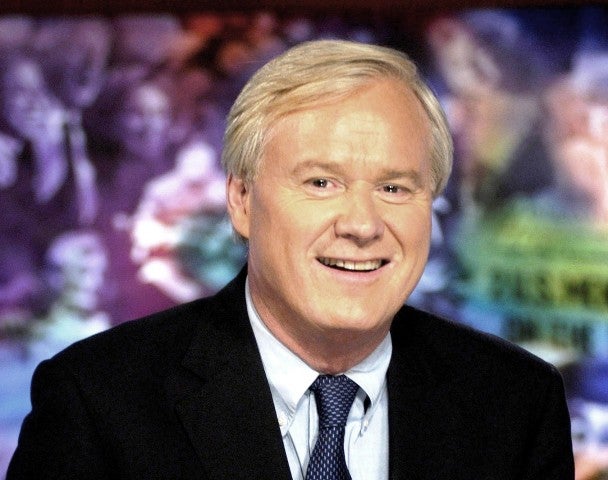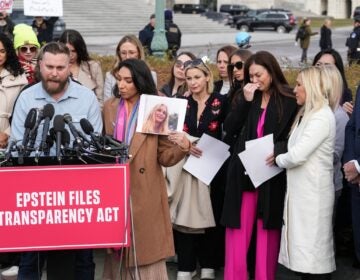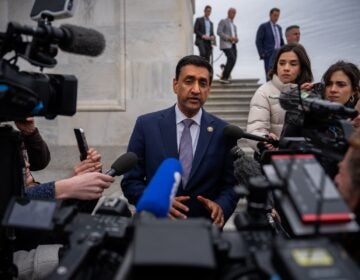MSNBC stars talk city issues and the election at Wharton

Oct. 25
By Thomas J. Walsh
For PlanPhilly
Two high-profile members of the national media fielded questions about the Presidential election and its startling dearth of discussion of urban affairs at the conclusion to “The Shape of the New American City,” a two-day conference co-hosted by the Penn Institute for Urban Research held October 24th and 25th on the Penn campus.
Chris Matthews, a Philly native and the host of MSNBC’s “Hardball,” and Howard Fineman, Newsweek’s Washington bureau chief and a frequent guest on MSNBC, said it was because the policy debate has been framed by – and built around – exurban voters, in what Fineman called “the newest cities and newest edges of the cities.”
This is despite 83 percent of Americans living in cities or suburbs, generating 89 percent of the nation’s wealth, according to a question posed by moderator Phyllis Kaniss, executive director of the co-hosting American Academy of Political and Social Science.
“At the most we’re ambivalent about cities, in America,” said Fineman, who grew up in Pittsburgh. “We’ve had a bias against it.” The golden years for cities came during the 1920s through the ’60s, he said, “the only time where cities were thought to be the real America.” After the tumult and riots of the late ’60s, Fineman said suburban flight accelerated, but that it was Ronald Reagan who said it was not in the cities, but in “the rooted values of the old agrarian ideal” (idealized in the suburbs) where the real America could be found.
Both Fineman and Matthews said Barack Obama knows he has the urban vote and has taken the fight to where it is being waged – on the battleground expertly set up in recent years by the likes of Republican strategist and George W. Bush senior aide Karl Rove.
Obama, emerging from one of the most urban places in the nation in the South Side of Chicago, is addressing some of the concerns of cities, Fineman said, but he “is putting all this in the framework of energy and education and healthcare.” Earlier he had said, “Both the ideas and many of the gains to be made in terms of energy can be made here in cities like Philadelphia.”
Matthews was frank about his choice of candidate, though anyone who knows him from television was not surprised. Obama in his career has championed tenants’ rights, voters’ rights and fought to rid low-income housing of asbestos, among other “communitarian values” and urban issues, he said. Do you want him “or someone who thinks about this crowd here in a negative way? John McCain knows who you are, and he doesn’t like you.”
Further, McCain running mate Sarah Palin “is from the very farthest corner of the farthest city,” Fineman said. “She grew up in a tiny town where she shot her dinner” (big laugh) that has become the kind of town more typically suburban and more typically a Rovian Republican stronghold. Those voters, in those places, have been the balance wheel of presidential politics, he said.
Joining the two on the panel were Eugenie Birch, a Penn professor of urban research and community development; Susan Wachter, a professor of real estate and finance at Penn’s Wharton School; and David Lei and Ashwin Shandilya, editors at Penn’s student newspaper, The Daily Pennsylvanian.
Lei and Kaniss wanted to know why the press did not simply pursue the subject more.
Fineman offered no excuses. “Because we follow the battle,” he said. “Mostly what we do is follow conflict.”
Matthews drew frequent laughs from the crowd, but he said that the serious issues have been pushed aside because Democratic candidates are so fearful about discussing taxes, for instance. The whole “Joe the Plumber” episode is all about class, he said, and the fact that Democrats clearly do believe in income redistribution.
“Sarah’s for every war there is, for every bailout there is,” yet somehow thinks taxes are punitive, Matthews said. “Well, no.” The definition of a conservative is someone responsible for his or her costs, he said. The war in Iraq and other “international adventurism” has to be paid for. “It’s an absurdity – and everyone has bought into it.”
The two briefly discussed disinvestment in the public sector, and Matthews talked about the shift of resources and population (and its accompanying Congressional representation) to the Sun Belt over the last 30 years. Two words say it all, he said – “air conditioning.” Places like Florida and cities in Texas and Arizona used to be insufferable, he said.
Now they are “the Republican promised land,” Matthews said. “Cities used to own this country. The Northeast owned this country. Pennsylvania [not very long ago] had more electoral votes than California.”
Matthews and Fineman are both currently Penn parents and were on campus for “Penn Parents’ Weekend.”
The Daily Pennsylvanian’s Shandilya asked the reporters how they dealt with people being interviewed who avoided their questions by diverting into political stump speech rhetoric.
Said Matthews: “You become unpopular, because you have to be obnoxious,” adding that he was comfortable bearing that burden. He cited long-time ABC White House correspondent Sam Donaldson, who “still asks the question that people want to know,” for showing him how to keep after the answer for a second and then a third time.
“The worst are the surrogates who come on my show who think they can get away with it,” Matthews said. These guests then accuse him of being rude, but, “Polite is answering the question put to you.” He said his job was sometimes “bayonet practice” – repeatedly taking stabs at the heart of the matter.
Wachter asked them how the media has helped us understand the current global financial crisis, and how to get out of it. She asked if the media had been helpful leading up to the meltdown. Their collective answer: Not so much.
“The real heroes are the print journalists at the daily newspapers,” said Matthews. “Not the bloggers, not the idiots – real journalists” behind stories that “are heavily edited, highly reported.” Television, he said, has not yet figured out how to do financial reporting. “Print has been the star.” (Matthews spent 15 years at the San Francisco Examiner and San Francisco Examiner.)
“But even within print,” Fineman said, the media has not done the greatest job. “Most reporters, even the good ones at print publications, don’t know jack about economics.” There’s a continuing bias for drama, as well, and it is hard to make interest rates exciting unless there’s a crisis – and then it’s too late to help people,” he said.
Contact the reporter at tom@thomasjwalsh.info.
WHYY is your source for fact-based, in-depth journalism and information. As a nonprofit organization, we rely on financial support from readers like you. Please give today.






